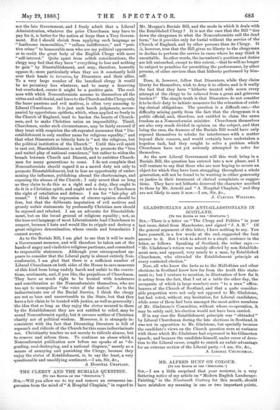THE CLERGY AND THE BURIALS QUESTION.
[To TICE EDITOR. OF THE " SPECTATOR."]
you allow me to try and remove an erroneous im- .pre3siou from the mind of "A Hospital Chaplain," in regard to
Mr. Morgan's Burials Bill, and the mode in which it deals with the Established Clergy ? It is not the case that the Bill "ties down the clergyman to what the Nonconformists call the dead form," for it provides only for burial without the service of the Church of England, and by other persons than its Clergy. It is, however, true that the Bill gives no liberty to the clergyman to decline to perform the service in cases where he may think it unsuitable. In other words, the incumbent's position and duties are left untouched, except to this extent,—that he will no longer be subject to penalties for permitting the performance, by other persons, of other services than that hitherto performed by him- self.
Does, it, however, follow that Dissenters, while they claim liberty for themselves, wish to deny it to others, and is it really the fact that they have "hitherto treated with scorn every attempt of the clergy to be relieved from a great and grievous burden P" The simple truth is that Dissenters do not consider it to be their duty to initiate measures for the relaxation of exist- ing clerical obligations. The question is a difficult one,—the difficulty arising partly from the fact that the clergyman is a public official, and, therefore, not entitled to claim the same freedom as a Nonconformist minister. Churchmen themselves are also very much divided in opinion on the subject, and that being the case, the framers of the Burials Bill would have only exposed themselves to rebuke for interference with a matter beyond their concern, and would certainly have undertaken a hopeless task, had they sought to solve a problem which Churchmen have not yet seriously attempted to solve for themselves.
As the new Liberal Government will this week bring in a Burials Bill, the question has entered into a new phase, and I will venture to say that those who are now hoping to secure an object for which they have been struggling throughout a whole generation, will not be found to be wanting in either generosity or justice in their treatment of clerical complaints or sugges- tions. They have not hitherto deserved the character ascribed to them by Mr. Arnold and "A Hospital Chaplain," and they are not likely to earn it now.—I am, Sir, &c.,
J. CARVELL WILLIAMS.


































 Previous page
Previous page